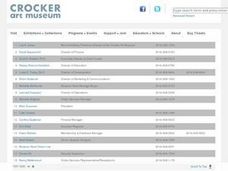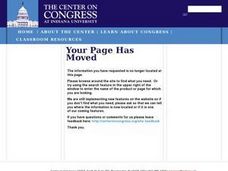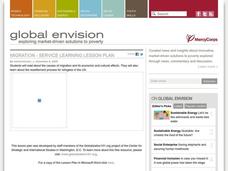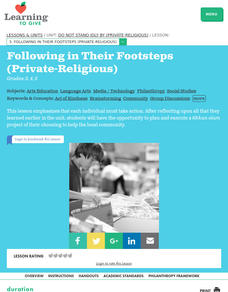Curated OER
A Lesson To Accompany "The First Bank of the United States: A Chapter in the History of Central Banking"
Here is an interesting topic. Learners examine the economics that led to the founding of the First Bank of America. They participate in a reader's theater experience depicting the debate between Alexander Hamilton and Thomas Jefferson...
Curated OER
When Art Conveys Political and Social Conflict
Twelfth graders consider art as a medium to convey information and opinions on social conflict and issues. They analyze images from the Crocker Art Museum, discuss their effectiveness in raising awareness of an issue, and create a...
Curated OER
Liberty for All: Voices from the Revolution
Did the Declaration of Independence really intend to grant liberty for all? Get your class thinking about historical perspective with documents relaying the experiences of women, white men, and African-Americans during the Revolutionary...
Curated OER
Home S-s-sweet Home The Eastern Massasauga Rattlesnake
Learners investigate the eastern massasauga rattlesnake's habitat. They examine how the habitat allows the snake to survive by completing a variety of activities.
Curated OER
Cashton Community Quilters
Fourth graders create and construct a fabric quilt symbolizing the heritage of the Wisconsin community of Cashton. They research Wisconsin historical symbols and use math skills to calculate the number and sizes of the quilt squares. ...
Curated OER
Courageous Heroes
Students investigate the concept of a hero. In this character education lesson, students define courage and discuss heroes they know. Students brainstorm ways to describe a hero and create an acrostic poem.
Curated OER
Character Education: Integrity
Eighth graders write about a quote given to them to reflect on the concept of integrity. In this integrity lesson plan, 8th graders connect personal experiences to the concept of integrity and write about it.
Curated OER
Get Ready, Get Set, Squeeze!
Young scholars explore coin value and count coin combinations. In this money counting and social studies lesson, students read The Coin Counting Book by Rozanne Lanczak Williams and practice counting money and making change for a...
Curated OER
What Would We Do?
Students develop an emergency plan for their pets. For this animal welfare lesson, students discuss how to keep their pets safe in an emergency and create pet emergency kits.
Curated OER
My Bank, My Decision!
Students create a three-part bank. In this savings lesson plan, students utilize the three-part bank to separate their spending needs, wants, and long term goals. Students share some of the money earned for donation. Students discuss the...
Curated OER
One Million Care Packages
Students read an article about sending care packages to soldiers in the United States military. Using the internet, they research the role of the USO and discuss their findings with the class. They find a local organization...
Curated OER
Singing for the Animals
Students examine the correct attitudes and poster for a concert. In this "Singing for Animals" lesson, students created charts to diagram information about the homeless animals they were singing for. Students used correct diction and...
Curated OER
Getting Involved at School
Students discuss ways to get involved in activities at school. In groups, they brainstorm a list of qualities of a person who is engaged in civics and how they can become involved in activities at school related to government. They...
Curated OER
Avoir, Être, et Le Passé Composé
The activity begins with direct instruction: how and when do we use avoir and être to form the past tense? After identifying the verbs that use either avoir or être, French learners write about five things they did the week prior. Then,...
Curated OER
A Web Of Workers
Students investigate different occupations and how they rely on each other. In this community lesson, students create a job web, linking occupations to other occupations that rely on each other. Students create their own perfect job...
Curated OER
Feel the Wonder
Students describe why clean water is important and how humans effect the quality of water in a community. They identify efforts in their community to keep the water clean. They participate in a water restoration movement in their area...
Curated OER
Migration
Students read sections from the Migration Issue Brief concerning why migration happens and the economic and cultural effects of migration. They study about the immigrant population in their own community.
Curated OER
Kure Waste Chase Game Lesson
Students work together to identify marine debris. They explain the effect of the debris on various ecosystems. They draw different types of ocean currents as well.
Curated OER
TE Lesson: Can You Taste It?
Students investigate how animals adapt to use its senses to identify foods that are nutritious or noxious. They determine how they associate foods with other things such as birthdays. They discuss the role of the nervous system in the...
Curated OER
Ilunga's Harvest Lesson
Students examine the culturally based impulse to share with others versus the impulse to watch out for oneself or one's immediate family. They probe the deeper meanings of "Ilunga's Harvest" and examine the impact of the events in...
Curated OER
The Way of Water in the World
Students explore problems and design solutions in relation to water issues. In this interdisciplinary lesson plan, students play an interactive game in order to explore global water issues to create solutions for the water problems in...
Curated OER
Ad Awareness
Students review advertisements. In this advertising lesson, students define advertising and determine the main reason ads are created. Students define what it means to be a consumer and advertiser. Students are divided into groups and...
Curated OER
Following in Their Footsteps
Students discuss earlier lessons on tikkun olam. They plan their own tikkun olam project and set deadlines for its completion. They reflect on the project after it is finished.
Curated OER
Super Seniors
Students research senior citizens who were heroes during the Reconstruction Era. They interview senior citizens who they believe to be heroes and write a biography about them. They explain how small acts can contribute to the common good.

























